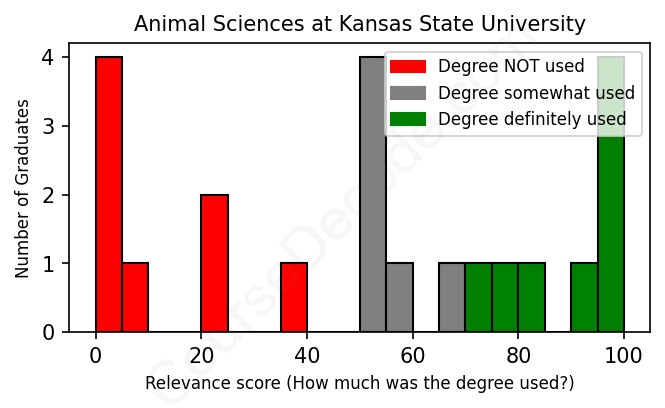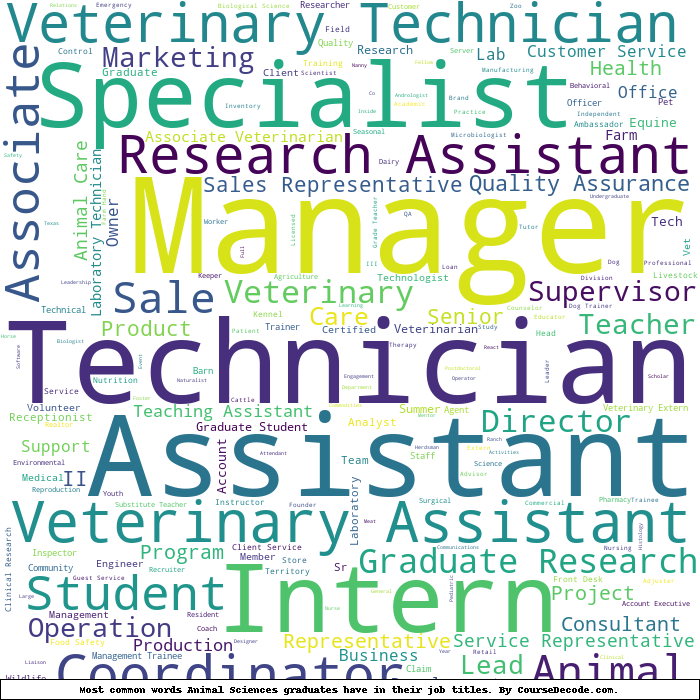
First, some facts. Of the Animal Sciences graduates from Kansas State University we've analyzed , here's how many have used (or NOT used) their degree in their career:

These are estimates based on AI analysis of 22 LinkedIn profiles (see below).
The verdict? Significantly below average. Overall, with an average relevance score of 51%, Animal Sciences graduates from Kansas State University have a much lower likelihood (-16%) of finding work in this field compared to the average graduate across all fields:
And for comparison, here's the chart for all profiles we've looked at across all degrees.
Also, after graduating, 40% of these graduates have pursued further education other than another Bachelor's degree (such as a Masters degree or other), compared to the average across all profiles of 35%. This suggests you may need more than just a Bachelors degree to be competitive as a Animal Sciences graduate.
See the details:
|
Relevance score: 100% We think this person has gone into a career highly relevant to their degree. We think this person has gone into a career highly relevant to their degree.
DEGREE INFOGraduated in 2018 from Kansas State University with a Bachelor of Science - BS in Animal Sciences. No other secondary education since. JOB HISTORY SINCE GRADUATIONFeed Foreman GREEN PLAINS CATTLE COMPANY LLC Jun 2018 - Sep 2019 Foreman  Handke Cattle Oct 2019 - Present ABOUTNo information provided. |
The top 10 most common jobs done by the graduates we've analyzed (ranked most common to least) are:
From examining the LinkedIn profiles of graduates from Kansas State University with degrees in Animal Sciences, it looks like many of them ended up in roles that aren't directly tied to the field. A considerable number have taken jobs in fields like sales, marketing, and administration, which seem to require more general skills rather than specialized knowledge in Animal Sciences. Positions like the Chemical Account Manager at Halliburton, various roles in customer service and sales, and even jobs in the oil and gas sector are common. These jobs are often focused on business management, logistics, or client relationships, and while some skills might be transferrable, they don’t actually apply the core concepts learned in their degree program.
However, there are graduates who have managed to find positions where their Animal Sciences background really shines, like in roles such as Veterinary Assistant, Animal Care Technician, and Extension Agent. These positions demonstrate a direct link to their studies, where knowledge about animal care, nutrition, or research comes into play. It's clear that while some graduates leverage their Animal Sciences degree to make an impact in related careers, others find themselves in unrelated fields, indicating a mixed bag when it comes to relevance. Overall, it seems like there's quite a divide in how these degrees translate into the job market, with a significant chunk of graduates moving away from purely animal-focused positions.
Here is a visual representation of the most common words in job titles for Animal Sciences graduates (this is across all Animal Sciences graduates we've analyzed, not just those who went to Kansas State University):

When you look at the career trajectories of graduates with a degree in Animal Sciences from Kansas State University, there are definitely some interesting patterns. For many, their first jobs after graduating tend to be roles that are somewhat related to animal care or applied sciences, like being a laboratory technician, animal care technician, or veterinary assistant. However, it's also common to see some graduates veering off into areas like sales, management, or internships that might not be directly tied to Animal Sciences. Fast forward five to ten years, and you'll notice a mix: while some folks have advanced into solid roles in animal health, nutrition, and veterinary practices, others have taken different paths entirely, like real estate or management positions in non-related fields.
Overall, many graduates seem to find their way into relevant careers within a few years, especially those who stay connected to the agricultural or veterinary fields. However, a notable number also drift away from their original animal science focus. This could mean they found better opportunities in other sectors or simply shifted interests, which is totally normal. So, while it’s clear that a degree in Animal Sciences can lead to meaningful and significant careers, it’s also good to be aware that not all paths are directly animal-related—even if that's where many of these graduates started out.
Honestly, a Bachelor's degree in Animal Sciences can be pretty challenging, but it's also super rewarding if you're passionate about animals and agriculture. At Kansas State University, or any other school for that matter, you’ll dive into subjects like biology, nutrition, genetics, and even animal behavior, which can get pretty in-depth and require a good bit of studying. It's not exactly a walk in the park, especially if you're not used to the science-heavy courses, but if you're genuinely interested in the material, it all starts to click into place. Just like any degree, it has its tough moments, but many students find ways to enjoy the learning process, especially with hands-on experiences in labs or farms. So, if you love animals and are up for the academic challenge, it could be a great fit for you!
Most commonly, in the LinkedIn profiles we've looked at, it takes people 4 years to finish a Bachelor degree in Animal Sciences.
Looking at the job history of these Animal Sciences graduates from Kansas State University, it seems like they have generally made decent money, especially considering the career progression in a lot of these roles. For instance, many have moved from entry-level positions to more specialized or managerial roles, which likely means their salaries have increased over time. Jobs like a chemical account manager or veterinarian typically come with solid paychecks, and roles in sales and management can also be quite lucrative. However, some like animal care technicians and early-career positions in agriculture might not pay as well initially. Overall, they seem to be doing alright financially, especially as they advance in their careers!
Here is a visual representation of the most common words seen in the "about" section of LinkedIn profiles who have a Bachelor degree in Animal Sciences (this is across all Animal Sciences graduates we've analyzed, not just those who went to Kansas State University). This may or may not be useful:

Here are all colleges offering a Bachelor degree in Animal Sciences (ordered by the average relevance score of their Animal Sciences graduates, best to worst) where we have analyzed at least 10 of their graduates:
| College | Score | Count |
|---|---|---|
 Purdue University Purdue University
|
80 | 14 |
 California State Polytechnic University-Pomona California State Polytechnic University-Pomona
|
78 | 13 |
 North Carolina State University North Carolina State University
|
77 | 18 |
 Iowa State University Iowa State University
|
75 | 25 |
 University of Missouri-Columbia University of Missouri-Columbia
|
75 | 12 |
 South Dakota State University South Dakota State University
|
73 | 10 |
 The Ohio State University The Ohio State University
|
71 | 21 |
 University of Florida University of Florida
|
68 | 15 |
 University of Vermont University of Vermont
|
68 | 12 |
 Michigan State University Michigan State University
|
67 | 20 |
 University of California, Davis University of California, Davis
|
66 | 27 |
 University of Illinois at Urbana-Champaign University of Illinois at Urbana-Champaign
|
63 | 16 |
 University of Tennessee, Knoxville University of Tennessee, Knoxville
|
61 | 13 |
 University of Arkansas University of Arkansas
|
60 | 10 |
 California Polytechnic State University-San Luis Obispo California Polytechnic State University-San Luis Obispo
|
59 | 22 |
 University of Wisconsin-River Falls University of Wisconsin-River Falls
|
58 | 10 |
 Texas A&M University Texas A&M University
|
54 | 34 |
 Penn State University Penn State University
|
53 | 14 |
 Texas Tech University Texas Tech University
|
51 | 12 |
 Kansas State University Kansas State University
|
51 | 22 |
 Oklahoma State University Oklahoma State University
|
43 | 16 |